854 Law and Small Business: Comprehensive Case Study on Business Law
VerifiedAdded on 2023/06/11
|5
|1340
|384
Case Study
AI Summary
This case study examines several legal issues faced by a small business owner named Paul. It explores the validity of a verbal agreement between Paul and his daughter Melissa regarding her employment, focusing on contract law and fair exchange. The analysis extends to Paul's contractual relationship with SAGA Limited, highlighting potential breaches and unfair alterations. Furthermore, the study delves into employment law, assessing Paul's treatment of his employees, Faye and Emily, and addressing issues such as misuse of company resources and employee rights to breaks. It also covers employee liability, specifically addressing Dave's misconduct and potential legal repercussions. Finally, the case study touches on commercial and consumer law, scrutinizing Paul's advertising practices and a liquor store's sale to Melisa, evaluating compliance with fair trading and consumer protection regulations. The document provides a detailed legal analysis of each scenario, offering insights into potential court outcomes and penalties. Desklib offers similar solved assignments and study resources.
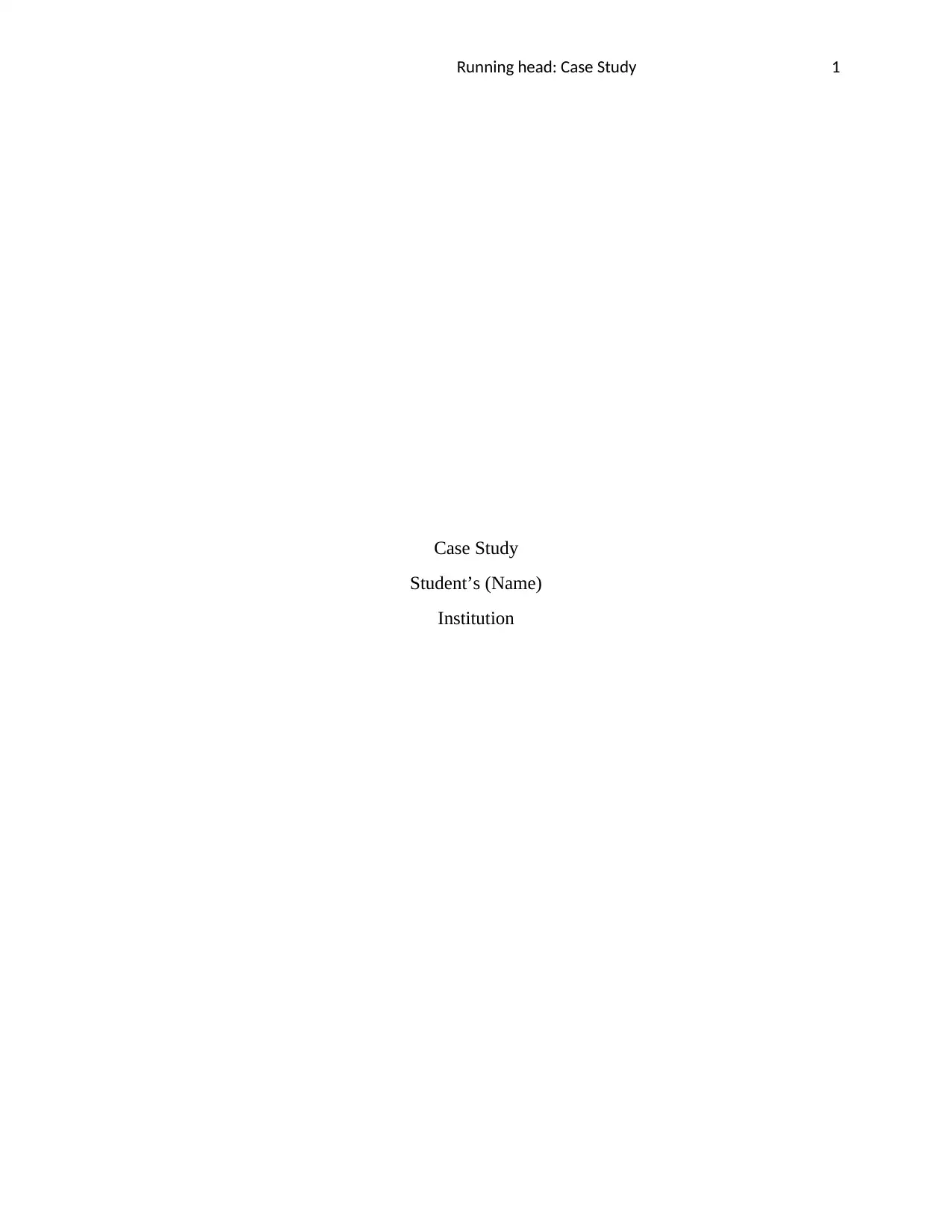
Running head: Case Study 1
Case Study
Student’s (Name)
Institution
Case Study
Student’s (Name)
Institution
Paraphrase This Document
Need a fresh take? Get an instant paraphrase of this document with our AI Paraphraser
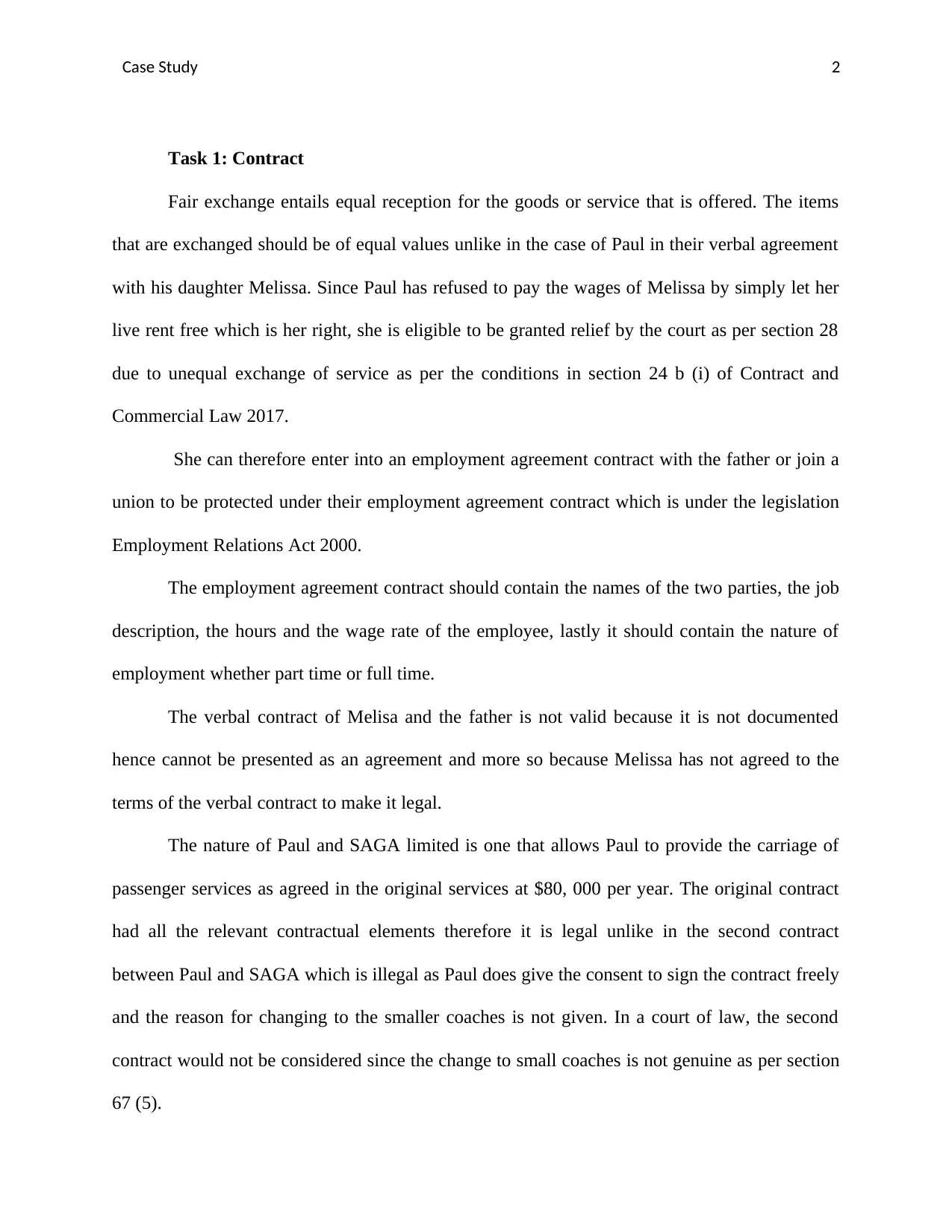
Case Study 2
Task 1: Contract
Fair exchange entails equal reception for the goods or service that is offered. The items
that are exchanged should be of equal values unlike in the case of Paul in their verbal agreement
with his daughter Melissa. Since Paul has refused to pay the wages of Melissa by simply let her
live rent free which is her right, she is eligible to be granted relief by the court as per section 28
due to unequal exchange of service as per the conditions in section 24 b (i) of Contract and
Commercial Law 2017.
She can therefore enter into an employment agreement contract with the father or join a
union to be protected under their employment agreement contract which is under the legislation
Employment Relations Act 2000.
The employment agreement contract should contain the names of the two parties, the job
description, the hours and the wage rate of the employee, lastly it should contain the nature of
employment whether part time or full time.
The verbal contract of Melisa and the father is not valid because it is not documented
hence cannot be presented as an agreement and more so because Melissa has not agreed to the
terms of the verbal contract to make it legal.
The nature of Paul and SAGA limited is one that allows Paul to provide the carriage of
passenger services as agreed in the original services at $80, 000 per year. The original contract
had all the relevant contractual elements therefore it is legal unlike in the second contract
between Paul and SAGA which is illegal as Paul does give the consent to sign the contract freely
and the reason for changing to the smaller coaches is not given. In a court of law, the second
contract would not be considered since the change to small coaches is not genuine as per section
67 (5).
Task 1: Contract
Fair exchange entails equal reception for the goods or service that is offered. The items
that are exchanged should be of equal values unlike in the case of Paul in their verbal agreement
with his daughter Melissa. Since Paul has refused to pay the wages of Melissa by simply let her
live rent free which is her right, she is eligible to be granted relief by the court as per section 28
due to unequal exchange of service as per the conditions in section 24 b (i) of Contract and
Commercial Law 2017.
She can therefore enter into an employment agreement contract with the father or join a
union to be protected under their employment agreement contract which is under the legislation
Employment Relations Act 2000.
The employment agreement contract should contain the names of the two parties, the job
description, the hours and the wage rate of the employee, lastly it should contain the nature of
employment whether part time or full time.
The verbal contract of Melisa and the father is not valid because it is not documented
hence cannot be presented as an agreement and more so because Melissa has not agreed to the
terms of the verbal contract to make it legal.
The nature of Paul and SAGA limited is one that allows Paul to provide the carriage of
passenger services as agreed in the original services at $80, 000 per year. The original contract
had all the relevant contractual elements therefore it is legal unlike in the second contract
between Paul and SAGA which is illegal as Paul does give the consent to sign the contract freely
and the reason for changing to the smaller coaches is not given. In a court of law, the second
contract would not be considered since the change to small coaches is not genuine as per section
67 (5).
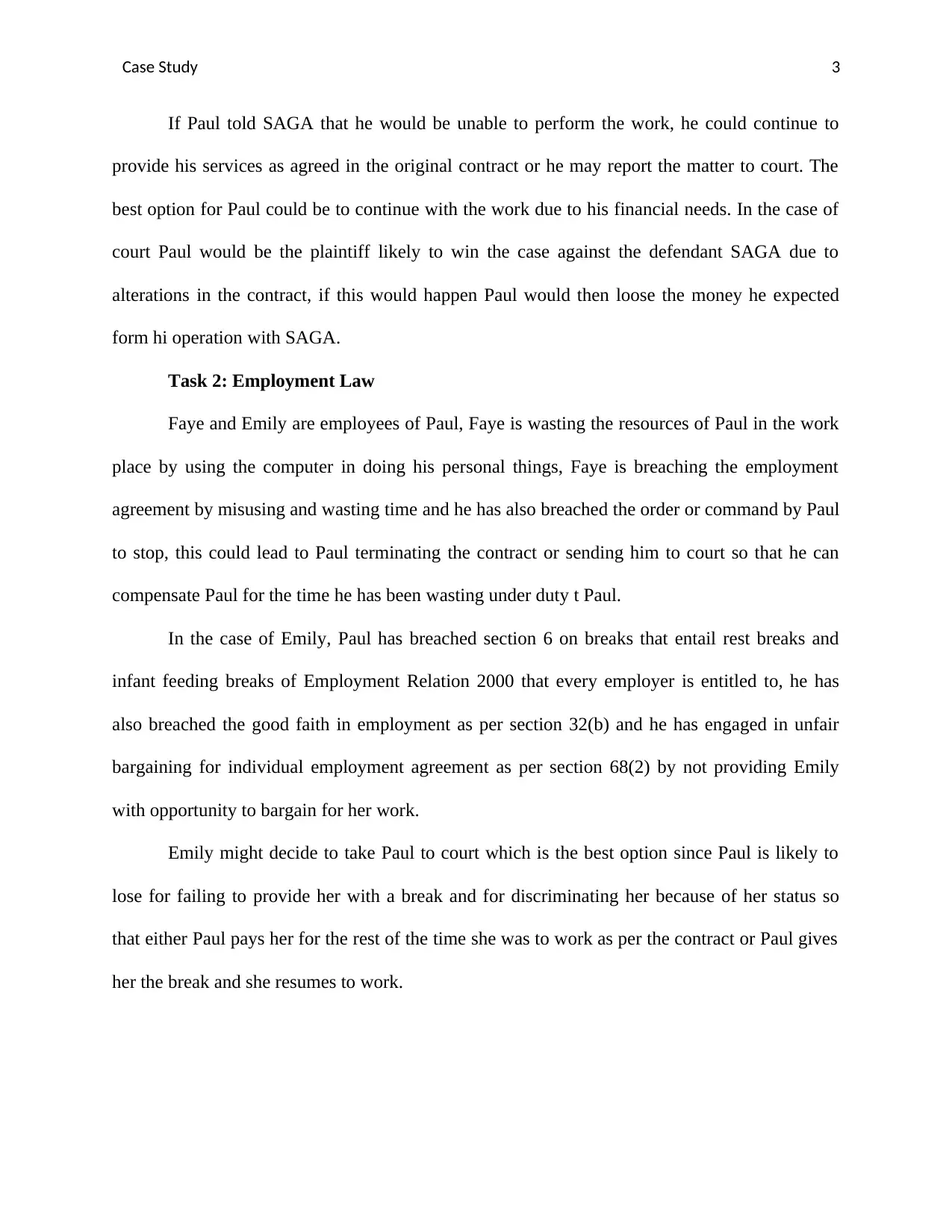
Case Study 3
If Paul told SAGA that he would be unable to perform the work, he could continue to
provide his services as agreed in the original contract or he may report the matter to court. The
best option for Paul could be to continue with the work due to his financial needs. In the case of
court Paul would be the plaintiff likely to win the case against the defendant SAGA due to
alterations in the contract, if this would happen Paul would then loose the money he expected
form hi operation with SAGA.
Task 2: Employment Law
Faye and Emily are employees of Paul, Faye is wasting the resources of Paul in the work
place by using the computer in doing his personal things, Faye is breaching the employment
agreement by misusing and wasting time and he has also breached the order or command by Paul
to stop, this could lead to Paul terminating the contract or sending him to court so that he can
compensate Paul for the time he has been wasting under duty t Paul.
In the case of Emily, Paul has breached section 6 on breaks that entail rest breaks and
infant feeding breaks of Employment Relation 2000 that every employer is entitled to, he has
also breached the good faith in employment as per section 32(b) and he has engaged in unfair
bargaining for individual employment agreement as per section 68(2) by not providing Emily
with opportunity to bargain for her work.
Emily might decide to take Paul to court which is the best option since Paul is likely to
lose for failing to provide her with a break and for discriminating her because of her status so
that either Paul pays her for the rest of the time she was to work as per the contract or Paul gives
her the break and she resumes to work.
If Paul told SAGA that he would be unable to perform the work, he could continue to
provide his services as agreed in the original contract or he may report the matter to court. The
best option for Paul could be to continue with the work due to his financial needs. In the case of
court Paul would be the plaintiff likely to win the case against the defendant SAGA due to
alterations in the contract, if this would happen Paul would then loose the money he expected
form hi operation with SAGA.
Task 2: Employment Law
Faye and Emily are employees of Paul, Faye is wasting the resources of Paul in the work
place by using the computer in doing his personal things, Faye is breaching the employment
agreement by misusing and wasting time and he has also breached the order or command by Paul
to stop, this could lead to Paul terminating the contract or sending him to court so that he can
compensate Paul for the time he has been wasting under duty t Paul.
In the case of Emily, Paul has breached section 6 on breaks that entail rest breaks and
infant feeding breaks of Employment Relation 2000 that every employer is entitled to, he has
also breached the good faith in employment as per section 32(b) and he has engaged in unfair
bargaining for individual employment agreement as per section 68(2) by not providing Emily
with opportunity to bargain for her work.
Emily might decide to take Paul to court which is the best option since Paul is likely to
lose for failing to provide her with a break and for discriminating her because of her status so
that either Paul pays her for the rest of the time she was to work as per the contract or Paul gives
her the break and she resumes to work.
⊘ This is a preview!⊘
Do you want full access?
Subscribe today to unlock all pages.

Trusted by 1+ million students worldwide
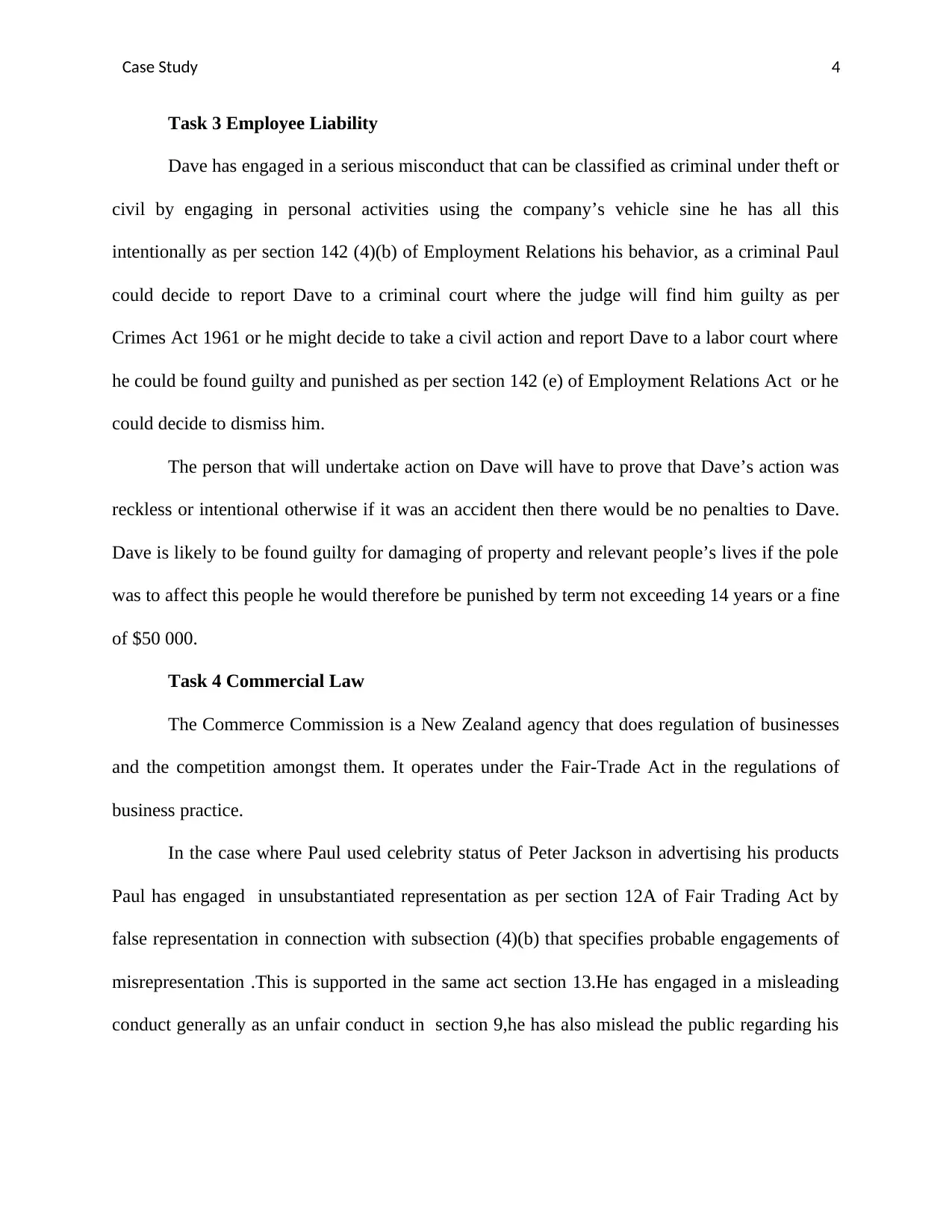
Case Study 4
Task 3 Employee Liability
Dave has engaged in a serious misconduct that can be classified as criminal under theft or
civil by engaging in personal activities using the company’s vehicle sine he has all this
intentionally as per section 142 (4)(b) of Employment Relations his behavior, as a criminal Paul
could decide to report Dave to a criminal court where the judge will find him guilty as per
Crimes Act 1961 or he might decide to take a civil action and report Dave to a labor court where
he could be found guilty and punished as per section 142 (e) of Employment Relations Act or he
could decide to dismiss him.
The person that will undertake action on Dave will have to prove that Dave’s action was
reckless or intentional otherwise if it was an accident then there would be no penalties to Dave.
Dave is likely to be found guilty for damaging of property and relevant people’s lives if the pole
was to affect this people he would therefore be punished by term not exceeding 14 years or a fine
of $50 000.
Task 4 Commercial Law
The Commerce Commission is a New Zealand agency that does regulation of businesses
and the competition amongst them. It operates under the Fair-Trade Act in the regulations of
business practice.
In the case where Paul used celebrity status of Peter Jackson in advertising his products
Paul has engaged in unsubstantiated representation as per section 12A of Fair Trading Act by
false representation in connection with subsection (4)(b) that specifies probable engagements of
misrepresentation .This is supported in the same act section 13.He has engaged in a misleading
conduct generally as an unfair conduct in section 9,he has also mislead the public regarding his
Task 3 Employee Liability
Dave has engaged in a serious misconduct that can be classified as criminal under theft or
civil by engaging in personal activities using the company’s vehicle sine he has all this
intentionally as per section 142 (4)(b) of Employment Relations his behavior, as a criminal Paul
could decide to report Dave to a criminal court where the judge will find him guilty as per
Crimes Act 1961 or he might decide to take a civil action and report Dave to a labor court where
he could be found guilty and punished as per section 142 (e) of Employment Relations Act or he
could decide to dismiss him.
The person that will undertake action on Dave will have to prove that Dave’s action was
reckless or intentional otherwise if it was an accident then there would be no penalties to Dave.
Dave is likely to be found guilty for damaging of property and relevant people’s lives if the pole
was to affect this people he would therefore be punished by term not exceeding 14 years or a fine
of $50 000.
Task 4 Commercial Law
The Commerce Commission is a New Zealand agency that does regulation of businesses
and the competition amongst them. It operates under the Fair-Trade Act in the regulations of
business practice.
In the case where Paul used celebrity status of Peter Jackson in advertising his products
Paul has engaged in unsubstantiated representation as per section 12A of Fair Trading Act by
false representation in connection with subsection (4)(b) that specifies probable engagements of
misrepresentation .This is supported in the same act section 13.He has engaged in a misleading
conduct generally as an unfair conduct in section 9,he has also mislead the public regarding his
Paraphrase This Document
Need a fresh take? Get an instant paraphrase of this document with our AI Paraphraser
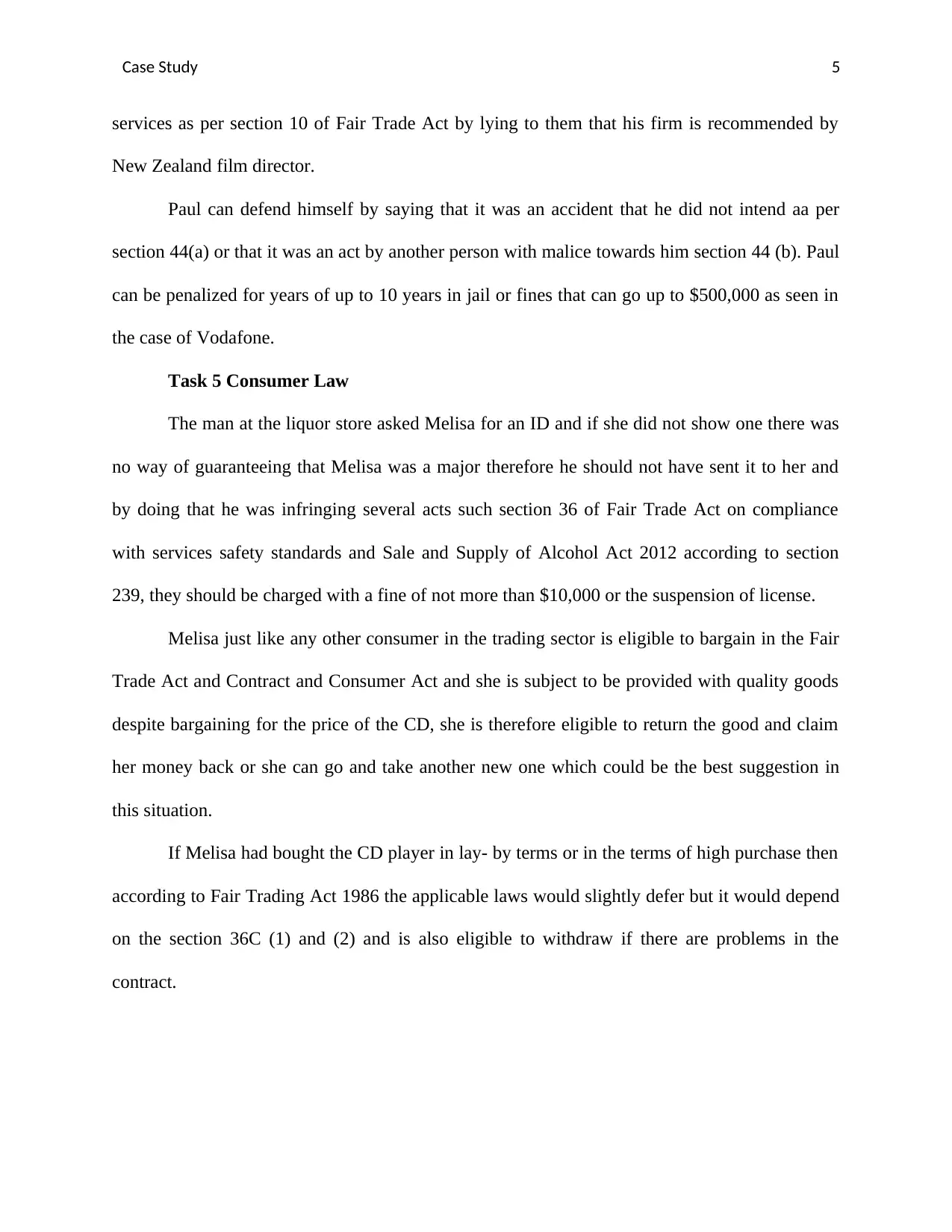
Case Study 5
services as per section 10 of Fair Trade Act by lying to them that his firm is recommended by
New Zealand film director.
Paul can defend himself by saying that it was an accident that he did not intend aa per
section 44(a) or that it was an act by another person with malice towards him section 44 (b). Paul
can be penalized for years of up to 10 years in jail or fines that can go up to $500,000 as seen in
the case of Vodafone.
Task 5 Consumer Law
The man at the liquor store asked Melisa for an ID and if she did not show one there was
no way of guaranteeing that Melisa was a major therefore he should not have sent it to her and
by doing that he was infringing several acts such section 36 of Fair Trade Act on compliance
with services safety standards and Sale and Supply of Alcohol Act 2012 according to section
239, they should be charged with a fine of not more than $10,000 or the suspension of license.
Melisa just like any other consumer in the trading sector is eligible to bargain in the Fair
Trade Act and Contract and Consumer Act and she is subject to be provided with quality goods
despite bargaining for the price of the CD, she is therefore eligible to return the good and claim
her money back or she can go and take another new one which could be the best suggestion in
this situation.
If Melisa had bought the CD player in lay- by terms or in the terms of high purchase then
according to Fair Trading Act 1986 the applicable laws would slightly defer but it would depend
on the section 36C (1) and (2) and is also eligible to withdraw if there are problems in the
contract.
services as per section 10 of Fair Trade Act by lying to them that his firm is recommended by
New Zealand film director.
Paul can defend himself by saying that it was an accident that he did not intend aa per
section 44(a) or that it was an act by another person with malice towards him section 44 (b). Paul
can be penalized for years of up to 10 years in jail or fines that can go up to $500,000 as seen in
the case of Vodafone.
Task 5 Consumer Law
The man at the liquor store asked Melisa for an ID and if she did not show one there was
no way of guaranteeing that Melisa was a major therefore he should not have sent it to her and
by doing that he was infringing several acts such section 36 of Fair Trade Act on compliance
with services safety standards and Sale and Supply of Alcohol Act 2012 according to section
239, they should be charged with a fine of not more than $10,000 or the suspension of license.
Melisa just like any other consumer in the trading sector is eligible to bargain in the Fair
Trade Act and Contract and Consumer Act and she is subject to be provided with quality goods
despite bargaining for the price of the CD, she is therefore eligible to return the good and claim
her money back or she can go and take another new one which could be the best suggestion in
this situation.
If Melisa had bought the CD player in lay- by terms or in the terms of high purchase then
according to Fair Trading Act 1986 the applicable laws would slightly defer but it would depend
on the section 36C (1) and (2) and is also eligible to withdraw if there are problems in the
contract.
1 out of 5
Related Documents
Your All-in-One AI-Powered Toolkit for Academic Success.
+13062052269
info@desklib.com
Available 24*7 on WhatsApp / Email
![[object Object]](/_next/static/media/star-bottom.7253800d.svg)
Unlock your academic potential
Copyright © 2020–2026 A2Z Services. All Rights Reserved. Developed and managed by ZUCOL.




